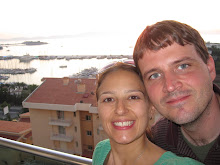 She lectured on women's rights and anti-slavery. She was often attacked for her political views. Nevertheless, and perhaps not without a bit of surprise, she married - a man whose ideology was akin to her own.
She lectured on women's rights and anti-slavery. She was often attacked for her political views. Nevertheless, and perhaps not without a bit of surprise, she married - a man whose ideology was akin to her own.Zinn provided part of the "Marriage Protest." I found what I assume is the rest of it at about.com:
The following was signed by Lucy Stone and Henry Blackwell prior to their May 1, 1855 marriage. The Rev. Thomas Wentworth Higginson, who performed the marriage, not only read the statement at the ceremony, but also distributed it to other ministers as a model that he urged other couples to follow.
While acknowledging our mutual affection by publicly assuming the relationship of husband and wife, yet in justice to ourselves and a great principle, we deem it a duty to declare that this act on our part implies no sanction of, nor promise of voluntary obedience to such of the present laws of marriage, as refuse to recognize the wife as an independent, rational being, while they confer upon the husband an injurious and unnatural superiority, investing him with legal powers which no honorable man would exercise, and which no man should possess. We protest especially against the laws which give to the husband:
1. The custody of the wife's person.
2. The exclusive control and guardianship of their children.
3. The sole ownership of her personal, and use of her real estate, unless previously settled upon her, or placed in the hands of trustees, as in the case of minors, lunatics, and idiots.
4. The absolute right to the product of her industry.
5. Also against laws which give to the widower so much larger and more permanent interest in the property of his deceased wife, than they give to the widow in that of the deceased husband.
6. Finally, against the whole system by which "the legal existence of the wife is suspended during marriage," so that in most States, she neither has a legal part in the choice of her residence, nor can she make a will, nor sue or be sued in her own name, nor inherit property.
We believe that personal independence and equal human rights can never be forfeited, except for crime; that marriage should be an equal and permanent partnership, and so recognized by law; that until it is so recognized, married partners should provide against the radical injustice of present laws, by every means in their power...
Amazing, isn't? I find those spaces where the "oppressed" find their voice simply fascinating. Surrounded by like minded people, she did things as her conscience dictated. She even kept her name. There is now a group devoted to that choice, called the Lucy Stone League.
Over one hundred and fifty years later, I still have to explain myself when I tell people that I am not changing my name. I wonder what Lucy Stone would say about that.





I LOVED that, and felt somewhat chagrined that I've never read it before. Was the Thomas Wentworth Higginson who married them the same guy who was so close to Emily Dickinson?
ReplyDeleteI miss you, dear friend!
P.S. I feel better about David Slade already, despite not having watched Hard Candy. I trust Ellen Page-how could she really be involved in something questionable?? Unless you consider X-Men questionable...which I don't! :)
P.P.S. My professor for this quarter said that he walked out of the Keira Knightley pride and prejudice! You and I saw that together! Did it really take so many liberties as to justify WALKING OUT??? Refresh my memory!